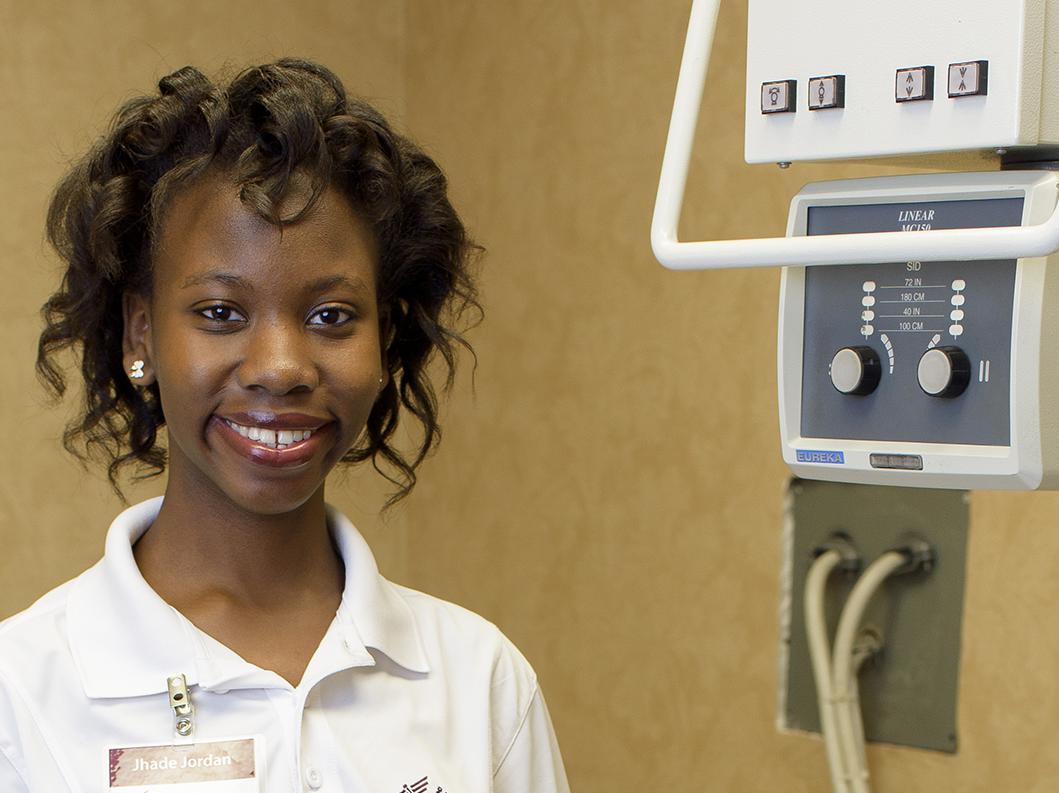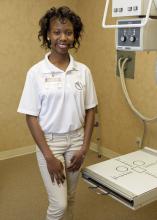Information Possibly Outdated
The information presented on this page was originally released on July 12, 2016. It may not be outdated, but please search our site for more current information. If you plan to quote or reference this information in a publication, please check with the Extension specialist or author before proceeding.
Rural Medical Scholars, 4-H inspire student
By Michaela Parker
MSU Extension Service
STARKVILLE, Miss. -- With only one doctor available in her hometown of Durant, Jhade Jordan understands the importance of practicing medicine in rural areas.
Jordan is a member of the class of 2016 Rural Medical Scholars program. High school seniors from across Mississippi spent June on the Mississippi State University campus to learn more about becoming a family medicine physician. Through this program, supported by the MSU Extension Service, she learned what it means to be a doctor.
“Being a doctor means being a provider, helper and leader in your community,” Jordan said. “It is not just a job title -- it is a personal relationship with the people in your community.”
Rural Medical Scholars Director Ann Sansing said the program focuses on the importance of practicing medicine in a rural community.
“Mississippi has the lowest number of physicians per capita in the nation. Almost half of all Mississippians lack access to primary care physicians,” Sansing said. “The MSU Extension Service and Rural Medical Scholars are working today to start a pipeline for tomorrow.”
Jordan was familiar with the MSU Extension Service before becoming a medical Scholar. She has been involved with 4-H since 2014. She spent a year with Holmes County 4-H before joining Lowndes County 4-H when she moved to Columbus to attend the Mississippi School for Mathematics and Science in 2015.
“4-H has taught me that you have to be a good leader in whatever you do,” Jordan said. “The community aspect of 4-H definitely inspired me to pursue being a doctor. I love and care for my community, and I want to serve the members of it by being a doctor.”
Students who participate in Rural Medical Scholars have the opportunity to take two premedical college courses, shadow local doctors and get a glimpse at what college life will be like.
“All of my Rural Medical Scholar classmates have the same mindset and want to reach the same goal,” Jordan said. “Just knowing that there are others who are interested in the same kind of things as me and are planning to be doctors means a lot to me.”
Rural Medical Scholars is for Mississippi high school students between their junior and senior years with composite ACT scores of 24 and high grade point averages. Students who are interested in the medical field are encouraged to apply.
“The objective of Rural Medical Scholars is to ‘grow local docs’ for the state,” Sansing said. “The program identifies talented students interested in medicine and shows them academics and experiences relevant to the life of a family medicine physician.”
Scholars shadow a different doctor each week. Jordan spent time with an obstetrician-gynecologist, an orthopedist, and pediatric and family medicine doctors while enrolled in the program.
“The doctors I shadowed should be teachers on the side because they were really good about explaining things to me, and they told me why they did certain things,” Jordan said. “They gave me a lot of insight. I learned a lot from them that I never thought about before.”
When Jordan entered the program, she did not know what medical specialty she wanted to practice. Spending time with the local doctors helped her discover her area of interest.
“I’ve always wanted to be a doctor, but I never knew what kind of doctor I wanted to be,” Jordan said. “The shadowing made me realize that I really liked being around kids and families. I could definitely see myself being either an obstetrician-gynecologist or pediatrician.”
Sansing incorporated 4-H into the program for the first time this year. Scholars were trained to be 4-H Junior Master Wellness Volunteers and learned about wellness and community service.
“The connection between 4-H and Rural Medical Scholars is a perfect example of teens utilizing all of the 4-H symbols representative of the head, heart, hands and health on the clover leaf,” Sansing said. “The 4-H Junior Master Wellness Volunteers program provides the community service requirement that is essential for medical school applications and to whatever career path they choose to take.”
Upon completion of medical school, Jordan said she wants to return to Durant and practice medicine in her hometown.
“I have a passion for medicine and the rural parts of Mississippi,” Jordan said. “I want to see my community and state do better. It seems like Mississippi is always the last at everything, and I want to help it become a better, more healthy place to live.”



